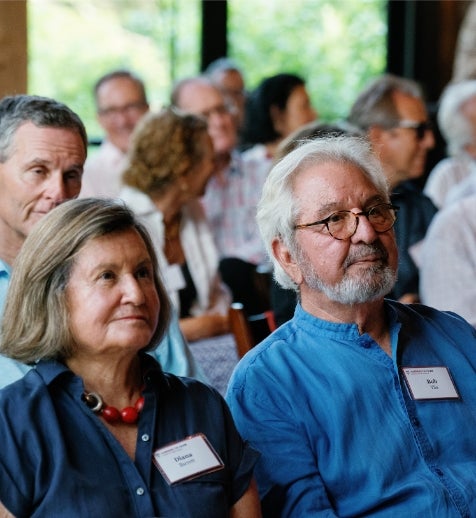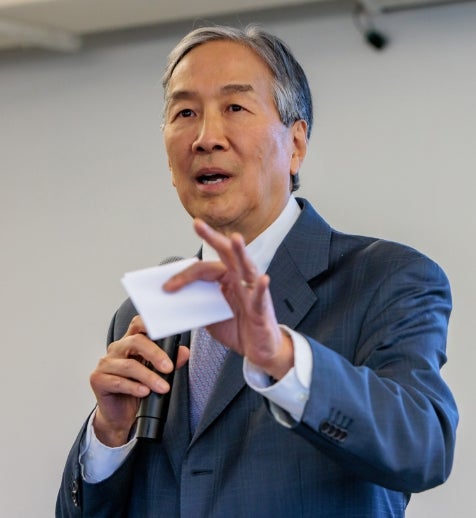Diana Barrett MBA ’74, DBA ’79 believes that creating a society where each person can reach their full potential starts with ensuring universal access to secure housing.
Homelessness in the United States has grown into a national crisis, affecting over 650,000 people on any given night. A severe shortage of affordable housing, combined with multiple social system failures, makes the problem hard to address. For those experiencing homelessness, the health impacts are staggering: their life expectancy is decades shorter than the general population, and up to three-quarters struggle with mental health and substance use disorders.
“There’s no great mystery,” Barrett says. “We don’t take care of people, and then we wonder why they’re not doing well.”
Barrett is confident that Harvard can drive meaningful change by convening experts, gathering data, and advocating for solutions.
“Harvard has a unique ability to bring together voices from across disciplines,” she says. “It’s about connecting people who might otherwise never meet, sharing insights, and finding solutions together.”
In 2019, Barrett made a gift to help launch the Initiative on Health and Homelessness (IHH) at Harvard T.H. Chan School of Public Health, providing additional support in 2022. From the start, she recognized the initiative’s potential to improve understanding of the pathways into and dynamics of homelessness, incorporate this knowledge into Harvard’s curricula to train future leaders, and unite experts across all sectors to influence policy and create a coordinated system of care and prevention. Her most recent gift in 2024 will expand research, education, and outreach efforts, advancing IHH’s goal of becoming a leading center in the national effort to end homelessness.

“Harvard has a unique ability to bring together voices from across disciplines. It’s about connecting people who might otherwise never meet, sharing insights, and finding solutions together.”
— DIANA BARRETT MBA ’74, DBA ’79
“The initiative simply wouldn’t exist without Diana’s support,” says Howard Koh, Harvey V. Fineberg Professor of the Practice of Public Health Leadership at Harvard Chan School and inaugural faculty chair for IHH. “Diana inspires us to aim higher and push harder to address one of the most glaring health inequities of our time. Right now, with her constant encouragement, we’re assembling an advisory group and intensifying our strategic planning. It’s challenging work, but we’re making progress, and we are all so proud of that.”
As IHH enters this next stage in its development, it builds on a strong foundation. To date, IHH has established a trusted national platform that connects a growing community of academic expertise and practice through regular events and collaborations. It also fosters and supports students to become leaders in the field through research opportunities, mentorship, and a new course on homelessness and health.
Changing the Narrative
As a board member of the Lord’s Place, a Florida-based organization focused on breaking the cycle of homelessness, Barrett has seen firsthand how quickly a life can unravel.
“Anyone could become homeless,” she says. “A car breaks down, you lose your job, and suddenly you’re facing eviction. But with the right support at the right time, homelessness is often preventable.”
Yet she finds that common misconceptions persist. “Every time I talk about my work on homelessness, people say, ‘Oh, they all have mental health problems, or they all struggle with substance abuse—it’s unsolvable, intractable.’ But that’s simply not true.”
After 25 years at Harvard, where she taught business and public health, Barrett left academia in 2005 to start the Fledgling Fund, a foundation dedicated to supporting films and other creative media projects that educate, engage, and mobilize people around complex social issues. She hopes IHH will shift public perceptions of homelessness through the power of storytelling.
“We live in a visual world, and storytelling is incredibly powerful,” she says. “If you see the challenges in cities like San Francisco—the image of tents lining the streets stays seared in your memory. No article alone can convey that.”
Koh shares this perspective.

“The initiative simply wouldn’t exist without Diana’s support. Diana inspires us to aim higher and push harder to address one of the most glaring health inequities of our time.”
— HOWARD KOH, FACULTY CHAIR FOR THE INITIATIVE ON HEALTH AND HOMELESSNESS AND HARVEY V. FINEBERG PROFESSOR OF THE PRACTICE OF PUBLIC HEALTH LEADERSHIP AT HARVARD CHAN SCHOOL
“We’re not going to make real progress unless we change the societal narrative around homelessness,” he says. “Right now, people experiencing homelessness are regularly dehumanized and stigmatized. At our public events, we increasingly feature people with lived experience who share their stories of resilience. When they speak, you can hear a pin drop.”
A Novel Solution to a Complex Problem
Research and education on health and homelessness in the U.S. have been critically underfunded and overlooked, leaving the academic community unable to fully investigate the root causes, health impacts, and possible solutions. As a result, people working to tackle this urgent health equity issue lack the robust evidence needed to develop effective systems, policies, and interventions.
As the first program of its kind within a school of public health, and one of only a few such academic hubs nationwide, IHH has made significant strides over the past five years. It launched Harvard’s first course dedicated to homelessness, covering essential topics such as demographic trends, the effect of structural racism, and the unique challenges faced by specific groups, including veterans and families.
“When students come to the University from around the world, they shouldn’t walk through Harvard Square and view people lying on the street as something normal,” says Koh. “At the very least, students should leave our School and University with a deeper understanding of the societal forces that put people there—and with insights into the policy solutions that could address and prevent homelessness.”
The initiative has become a draw for incoming graduate students, who cite it as a deciding factor in choosing Harvard for their studies. “Now, it’s possible for someone to build an academic career studying homelessness—a path that simply didn’t exist five years ago,” Barrett shares.
Through a monthly seminar series of research and practice, IHH convenes scholars and advocates to explore the complex intersections of health and homelessness. The initiative also leverages partnerships across the University—working with faculty in the health sciences, urban design, policy, law, and business—to promote a powerful interdisciplinary approach, including collaborations with the Harvard Joint Center for Housing Studies, the Harvard Kennedy School Government Performance Lab, and the Harvard Advanced Leadership Initiative.
“No one group or individual can solve this,” Koh says. “It must be a committed interdisciplinary response.”
The initiative has hosted several national summits to identify effective solutions, engage political leaders from mayors’ offices, and build an expanding network of external stakeholders, including the U.S. Interagency Council on Homelessness; the U.S. Department of Housing and Urban Development; the U.S. Department of Veterans Affairs; the Boston Health Care for the Homeless Program; state and local leaders in Massachusetts, California, Oregon, New York, Texas, and Illinois; and national nonprofits.
Barrett envisions IHH as a leading authority on health and homelessness. “I’d like Harvard to be so good at what we do that if someone asks, ‘What’s happening with homelessness right now in Atlanta?’ the answer would be, ‘Call Harvard. Call IHH. They’ll know.’ ”

